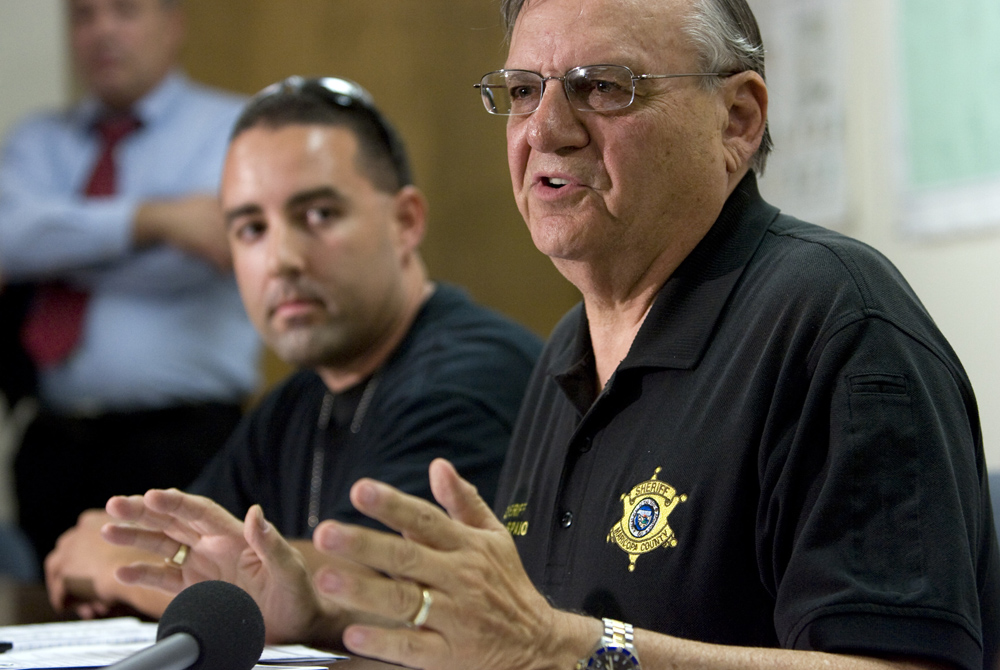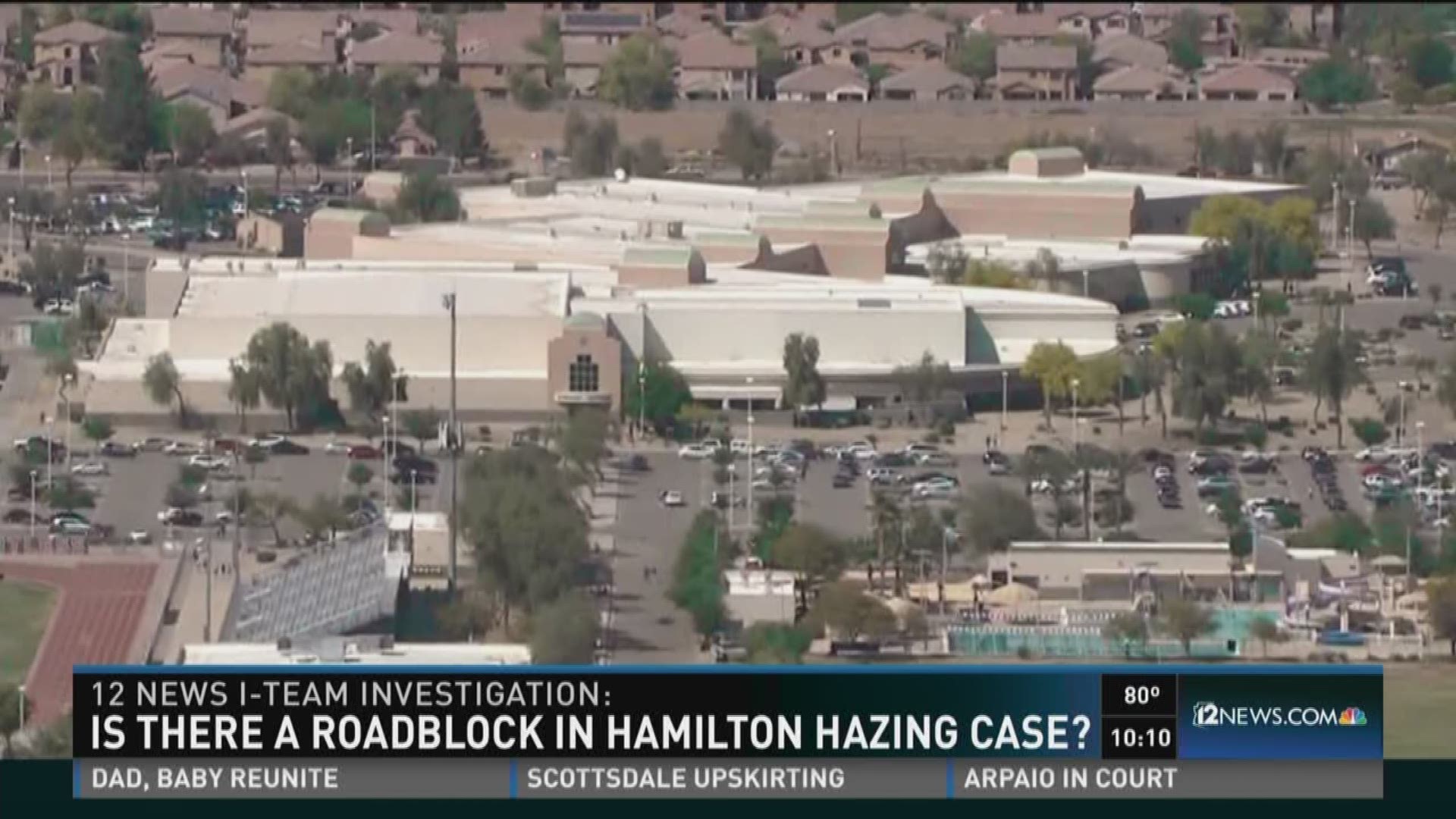A former supervisor of the MCSO Human Smuggling Unit testified in court Tuesday that Sheriff Joe Arpaio attempted to personally convince him to disregard a judge's court injunction.
MCSO Sgt. Brett Palmer was a supervisor and training officer in the MCSO's now-disbanded Human Smuggling Unit. U.S. District Court Judge Murray Snow is overseeing a contempt hearing this week regarding the sheriff's office's perceived lack of cooperation with the courts in the Melendres civil rights case.
Palmer testified about an alleged argument he had with Arpaio within a month after Snow issued his injunction in December of 2011 that MCSO should not detain individuals based solely on their status as illegal immigrants.
According to Palmer, deputies had pulled over a van on a highway carrying several suspected illegal immigrants. Palmer testified "three to five" of the individuals did not meet the criteria for state charges of human smuggling and appeared to have not broken any laws.
Palmer said he contacted Immigration and Customs Enforcement authorities to pick up the individuals for processing. But Palmer said ICE declined the request. Palmer said it was his understanding that, per the judge's order, MCSO was not authorized to continue holding the individuals.
"My recollection there was one or two females, a couple of small children and possibly another male," Palmer said Tuesday. "They only had the clothes on their back. They didn't' have any family in Arizona. What was I supposed to do?"
Palmer said he consulted with his direct supervisor and decided to contact Customs and Border Patrol in Casa Grande. A representative there told Palmer to transport the suspected illegal immigrants to their office.
Palmer says after he relayed the information to his chain of command, he was instructed to call Arpaio on his cell phone.
According to Palmer, Arpaio insisted he continue holding the people in custody.
"The sheriff took a very authoritative stance with me and told me I was not to release those individuals and I was told hold those individuals pending his arrival," Palmer told ACLU attorney Cecilia Wang during questioning.
Wang asked Palmer what his response was to the sheriff.
"I told him immediately it was an unlawful order and I would not follow it," Palmer said.
"Did you tell him it was in violation of a court order?" Wang asked.
"Yes," Palmer said.
According to Palmer, he argued back and forth with Arpaio.
"In short, I stuck my ground with the sheriff in respect to the order … in regards to the court order of December 2010," Palmer said.
Arpaio relented, according to Palmer, and told him instead to take photos of the individuals before sending them to Casa Grande.
According to previous court testimony, MCSO waited 18 months before fully implementing Judge Snow's injunction. Snow must decide whether there is sufficient evidence to hold Arpaio or other MCSO officials in criminal contempt for that delay and other issues.
Palmer said he spoke personally with Arpaio once every couple of months on matters related to the sheriff's office. When asked by Wang why he believed MCSO delayed the implementation of the judge's orders, Palmer said he had developed his own opinion based on his years in the sheriff's office and anecdotal evidence.
"What is your opinion about why the proposed training never took place?" said Wang.
"It was contrary to the goals and objectives of the sheriff," Palmer said.
In response, Michelle Iafrate, an attorney representing MCSO, got Palmer to acknowledge that he could not recall ever speaking with sheriff's attorneys about the details of the court order. Palmer also admitted he did not fully understand the injunction at the time.
Iafrate also questioned Palmer about his feelings toward the sheriff's office hierarchy.
"Isn't it true that you were passed over twice as a lieutenant?" Iafrate asked.
"Yes," Palmer responded.
"Isn't it true you believe you should have been promoted to be lieutenant?" Iafrate asked.
"Yes," said Palmer.
At the outset of the hearing, U.S. District Court Judge Murray Snow raised concerns about the sheriff's office's lack of progress in completing court-ordered internal investigations of deputies.
In February, Snow entered an order for MCSO to provide emails and documents related to internal investigations of deputies and MCSO commanders involved with the now-defunct Human Smuggling Unit.
MCSO attorney Michelle Iafrate told Snow there have been logistical and technical barriers to obtaining the records.
"We've been down this road before," Snow said, referring to MCSO's history of being unable to produce records requested by plaintiffs in the Melendrez civil rights case. Snow has set aside several days in June to continue the hearings.
"If we have to call witnesses back five, six, seven or eight times, we will get to the evidence and we will get all the testimony needed," Snow said.
This week's hearing is intended to address the allegations of civil contempt by sheriff's officials and obtain evidence for discovery regarding potential criminal contempt.
Sgt. Palmer's testimony came as a surprise to court observers and could be part of that evidence.
Sheriff Joe Arpaio and his Chief Deputy Jerry Sheridan were in court during the hearing. Both are expected to be called to testify.
During the morning, MCSO Chief of Enforcement David Trombi was the first witness called to testify. Trombi was a direct supervisor over HSU during its existence.
Trombi said he was not aware of how deputies collected or registered evidence, including video-recorded traffic stops. Trombi said he didn't know of policies regarding how traffic stops were to be recorded, nor was he aware of how many sworn deputies were equipped with body cameras.
One of the issues is whether MCSO officials intentionally withheld videos and other evidence related to traffic stops in the Melendrez case.
Judge Snow ruled in 2013 in favor of the plaintiffs, concluding that MCSO systematically racially profiled Latinos during traffic stops and neighborhood crime-suppression patrols.
Snow also concluded that MCSO based its immigration enforcement policies on "a fictitious law."
Remedies ordered by Snow included the implementation of an independent court monitor, the termination of immigration-related operations and several accountability measures for deputies to prevent further abuse of power.
However, since the ruling, MCSO attorneys have acknowledged that videos recorded by deputies during traffic stops were never turned over to the court during the trial.


